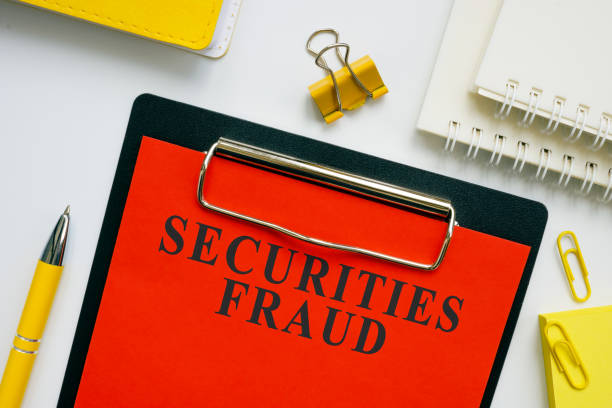If you suspect securities fraud, acting swiftly and following proper legal steps is crucial. Start by gathering detailed documentation of the suspicious activity, including communications and transaction records. Report your concerns to regulatory bodies such as the SEC or FINRA. Consulting a securities attorney can help you navigate complex legal processes and protect your rights. Timely action increases your chances of recovery, helps hold fraudulent parties accountable, and protects other investors.
Understanding Securities Fraud
Securities fraud casts a long, ominous shadow over the financial markets, eroding trust and integrity. With methods ranging from insider trading to disseminating false information and complex Ponzi schemes, these deceptive practices are designed to exploit unsuspecting investors for illicit gains. One might imagine these as intricate webs woven by fraudsters to trap the unwary. Given how complicated these schemes may be, it is beneficial and crucial for anybody dealing with securities to comprehend their workings and recognize their warning signals.
For investors in Minnesota or those who have encountered questionable market practices, reaching out to an experienced MN securities lawyer is a strategic move. Legal guidance is invaluable in navigating these turbulent waters, especially considering the broader economic impact, which includes shaken market confidence and potential destabilization of financial systems. In many instances, the precursory steps investors take in response to fraud can determine the recovery of their investments.
Identifying Signs of Securities Fraud
Recognizing the warning signs of securities fraud is akin to reading the subtle hints of nature before a storm. Promises of high returns with little risk are classic bait fraudsters use to lure investors into their schemes. Beyond just too-good-to-be-true guarantees, other red flags include pressure sales tactics, lack of transparency, and missing documentation. Specific schemes may also employ emotional manipulation or appeal to investors’ greed or desperation, making it essential to maintain skepticism when confronted with atypical investment opportunities.
The benefit of hindsight has granted us numerous case studies, such as historical Ponzi schemes orchestrated by figures like Bernard Madoff, which offer valuable lessons. Familiarity with these tales helps discern patterns and protect oneself from future fraud risks. An informed investor is well-equipped to stave off deceit, making education and awareness paramount.
Consulting with Legal Professionals
When the specter of fraud looms, legal professionals act as beacons, guiding victims through stormy seas. Their expertise in securities law offers clarity, demystifying the legal labyrinth that victims must traverse. Choosing the right legal representative involves considering their past success in handling securities fraud cases and their ability to communicate the complexities of such cases in layman’s terms.
The benefits of engaging a competent legal advisor are manifold. They provide knowledge and strategic insight into legal rights and options, and assist in correctly drafting and presenting reports that effectively encapsulate the severity and specifics of the claim. This professional guidance is often a linchpin in the successful pursuit of justice and the reclamation of losses.
Collecting and Documenting Essential Evidence
A backbone of solid evidence is at the heart of any successful securities fraud claim. Gathering evidence requires diligence and organization—every email, statement, contract, or communication can be crucial to the evidentiary puzzle. This meticulous documentation solidifies individual claims and contributes to a blockchain of information, enhancing the collective defense against fraudulent practices.
Maintaining a thorough and secure documentation archive signals a proactive and vigilant stance, demonstrating to authorities the legitimacy and seriousness with which the claim is pursued. The role of comprehensive documentation extends beyond individual benefit, reinforcing the protective infrastructure of the financial markets as a whole.
Filing a Report to the Relevant Authorities
Once equipped with thorough evidence, victims must accurately report the fraud. Understanding the appropriate channels is critical; these often include national bodies such as the Securities and Exchange Commission (SEC) and state-specific regulatory agencies. Navigating their submission processes and criteria ensures the complaint is received and acted upon promptly.
It cannot be overstated how important it is to maintain transparency and foster cooperation with these entities. Such collaboration aids in expediting investigations and achieving resolutions, reinforcing a system built on trust and accountability. Efficient reporting enhances personal claims and contributes to the broader regulatory framework, deterring future fraudulent activity.
The Investigation Process
Relevant authorities spearhead an intricate investigation process upon report submission. This phase delves into verifying the evidence provided, potentially involving interviews with witnesses and detailed examinations of the financial trails. The objective is not merely punitive—it aims to elucidate fraud mechanisms, thus fortifying market operations and contributing to regulatory reforms.
Grasping the complexities and timelines of these investigations is crucial for setting realistic expectations. While the journey from report to resolution may be lengthy, patience and continued cooperation with investigative bodies often increase the likelihood of a favorable outcome. The integrity and vitality of market systems depend, in part, on individuals’ commitment to see these processes through to conclusion.
The Role of Educating Investors
In the battle against securities fraud, education serves as both sword and shield. Equipped with current information, empowered investors are far less likely to become victims of scams. Awareness of evolving market trends and potential threats enriches decision-making capabilities and strengthens overall financial acumen.
Countless resources and programs are accessible for those eager to expand their market understanding. For example, resources that delve into common tactics employed in securities fraud are valuable. They offer insights that safeguard investments and ensure investors remain one step ahead of potential threats.
Recovering Financial Losses
The path to recovering financial losses due to securities fraud can be fraught with challenges, but it is not impossible. Victims have several avenues available for recompense, including legal actions and settlements. While these routes necessitate strategic foresight and often a robust legal framework, they offer pathways to restoration for those wronged.
Support networks, including counseling and legal assistance groups, are pivotal in guiding victims through recovery, ensuring they receive the necessary support and advice. In-depth resources, like the investigation insights offered on the CNBC website, provide vital information, empowering victims with knowledge and tools to pursue justice effectively.



